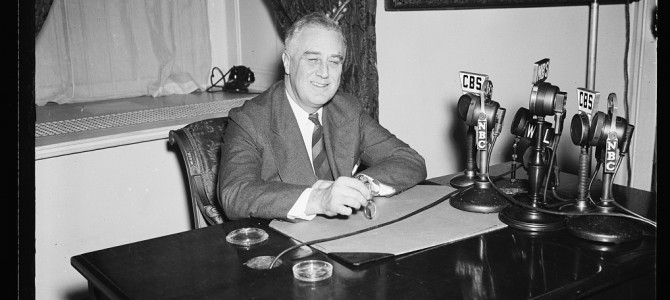
What’s a historian to make of Trump? Well, what’s anyone to make of Trump? Economic pundits Stephen Moore and Larry Kudlow not too long ago scratched their heads (don’t we all?) and concluded the Donald’s nationalistic trade policies reminded them that “The last American president who was a trade protectionist was Republican Herbert Hoover.”
“Does Trump aspire,” they asked, “to be a 21st century Hoover with a modernized platform of the 1930 Smoot-Hawley tariff that helped send the U.S. and world economy into a decade-long depression and a collapse of the banking system?”
Not a flattering comparison at all. Hoover’s Hawley-Smoot Tariff remains uniformly derided as a key ingredient in worsening the Great Depression. Visions of a U.S.-Chinese trade war now haunt free-trading economists and multinational corporations. Add to the mix Hoover’s much lesser-known executive order to ban all immigration, and the brushstrokes begin to hit the canvas, painting the unbecoming portrait of the Donald as the Herbert.
The Comparison Seems to Strengthen
But wait—as they say on television—there’s more. Prior to reaching the White House, Herbert Hoover (like Trump) held not one elective office, competed not even for a single elective office. Some suspected him (horrors!) of once even being a Democrat! And if that were not the case (it wasn’t), Hoover’s conservative credentials certainly needed work. Hadn’t he bolted the Grand Old Party in 1912 to support the progressive, Theodore Roosevelt?
Then there’s obvious business comparison. What was Herbert Hoover, if not a successful businessman? He was a go-getter, an individual who got things done, made money, hobnobbed with the business class. He was one apart from the political class—a self-confident know-it-all who simply infuriated the party’s existing power structure.
Hadn’t Cal Coolidge himself privately derided Hoover as the “Wonder Boy”? Hadn’t Senate Majority Leader Charles Curtis exclaimed in 1928: “The Republican Party cannot afford to nominate Herbert Hoover. It would be apologizing for him from the moment of nomination until the polls close in November”?
Yet analogies go only so far. Donald Trump is clearly not Herbert Hoover. Trump is interesting. Hoover was dull as paint, the antithesis of inspirational. “If you put a rose in Hoover’s hand,” Gutzon Borglum pronounced, “it would wilt.” Herbert Hoover wilted roses in 1932. Franklin Roosevelt didn’t.
Try Comparing Trump to Roosevelt
Their messages might be very different, but Roosevelt and Trump both inspire. Not everyone, of course—that’s for sure—but those willing to be inspired surely are. So, let us now look at Donald Trump as a puzzling amalgam of two polar opposites: Herbert Clark Hoover and Franklin Delano Roosevelt.
Like Trump, the FDR of 1932 was an Upper East Side New Yorker revered not so much by his fellow northeasterners but by, as H. L. Mencken indelicately phrased it, “the half-witted yokels of the cow and cotton States.”
By 1932, the charm of Hoover’s self-made wealth had clearly worn thin, but Roosevelt’s inherited (like Trump’s) fortune proved no barrier to his rise. It somehow merely added to his charm. Nor would Franklin’s vexing inconsistency stall his rise. Was FDR for the League of Nations? Not anymore, thank you. What about Prohibition? “If you are Wet, vote for [Al] Smith,” jeered one opponent in the California primary, “If you are Dry, vote for [John Nance] Garner, —If you don’t know what you are, Vote for Roosevelt.”
Heywood Broun excoriated FDR as a “corkscrew candidate . . . To him the presidency is a prize somewhat after the nature of a brass ring which can only be captured by someone who approaches it whirling furiously in circles. From the very beginning of his dervish drive . . . no consideration except expediency has governed any one of his decisions.” Fellow columnist Walter Lippmann dismissed Roosevelt as “a man without any important qualifications for the office, who would like very much to be President…”
As for immigrants, well, despite Hoover’s executive order on the subject, Irish-Catholic immigrant stock (particularly of the Boston variety) threatened to bolt the Democratic Party rather than support FDR. “Massachusetts Drifts to Hoover,” reported The Nation. The New York Times headlined, “BAY STATE DOUBTFUL ON RESULT OF VOTING: Present Indications Point to Slight Advantage for President Hoover.” Let us also recall Franklin Roosevelt as the last Democratic candidate to lose the black vote.
Or Maybe He’s in His Own Class
So there you have it, Messrs. Moore and Kudlow: is Trump really Hoover, or Roosevelt, or both? Or more puzzling of all: is Trump both Hoover and FDR but with a heaping dash of another giant figure of that era thrown in for a generous hint of spice? I speak, of course, of the Louisiana’s then newly-elected senator: Huey Pierce “The Kingfish” Long.
Long, after all, once warned his Senate colleagues: “A mob is coming here in six months to hang the other ninety-five of you damned scoundrels, and I’m undecided whether to stick here with you or go out and lead them.” With more than some truth, “The Kingfish” once described himself saying he was sui generis.
Meet Donald Trump: sui generis 2.0. And good luck to any observer trying to pigeonhole him with one analogy—or two—or three.
I won’t. I’m just getting started.









